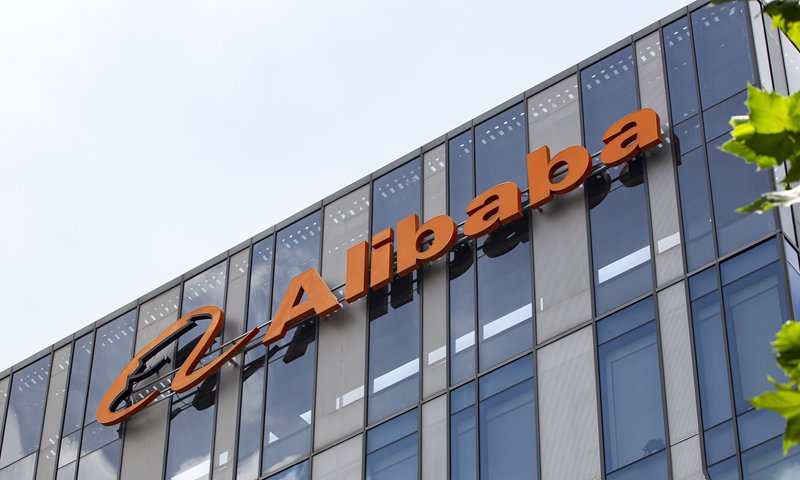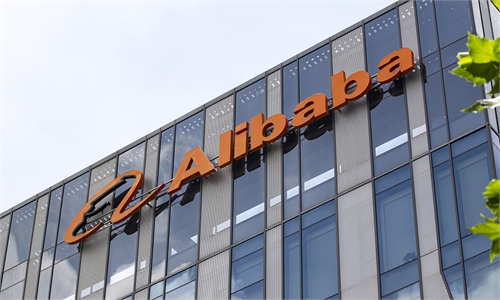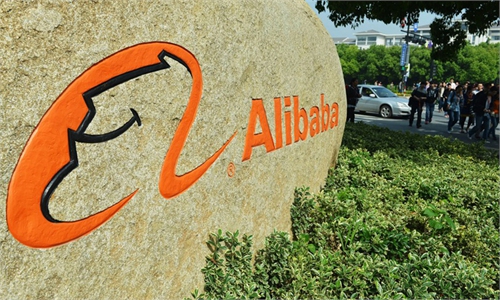
Alibaba Photo:VCG
Alibaba Chairman and CEO Daniel Zhang assured investors of no major impact from a record $2.8 billion antimonopoly fine on the e-commerce giant at a conference call on Monday prior to the market opening.As the operator of China's largest e-commerce platform, Alibaba has hundreds of millions of users and millions of merchants, and it doesn't rely on exclusivity to retain its merchants, Zhang said.
"If you look at the exclusivity arrangement before, I would say this only covered a number of Tmall flagship stores, which [are] directly operated by brands. But actually, today, all the merchants have multi-platform strategies ... business-wise, we don't expect material negative impact on the change of this arrangement."
In a sign of the uncertainty arising from a more-than-three-month antitrust probe may have eased, Alibaba shares opened 5.5 percent higher on Monday in the Hong Kong market and the gain quickly picked up steam later on.
In a statement announcing the penalty on Saturday, the State Administration for Market Regulation (SAMR) said Alibaba has abused its market dominance to subject vendors on its platform to a coerced pick of one out of two platforms since 2015, constituting violations of the country's Anti-Monopoly Law.
The fine accounts for about 4 percent of the company's domestic revenues in 2019 and it's the largest anti-monopoly fine ever rolled out by Chinese authorities.
The penalty decision was the result of an investigation that was commenced in December 2020, relating to activities that would be prohibited under the Anti-Monopoly Law specifically under article 17, clause four of the law that a business operator that has a dominant market position is prohibited from restricting business counterparties by requiring exclusive arrangements without justifiable cause, Joe Tsai, the executive vice chairman of Alibaba, said in opening remarks at Monday's conference call.
The penalty decision described the results of SAMR investigation, and concluded that Alibaba was in violation of article 17, clause four of the law. As a result, Alibaba as a platform operator shall not restrict merchants from doing business or running promotions on competitor platforms.
"The SAMR provided an administrative guidance for Alibaba to implement a comprehensive program of rectification, including strictly fulfilling our responsibility as a platform operator, strengthening our internal controls and compliance, upholding fair competition and protecting the interests of our platforms, consumers, and merchants," Tsai said.
He put in perspective that under the Anti-Monopoly Law, monetary penalty of up to 10 percent of revenues can be imposed at the discretion of the authorities.
The penalty is equivalent to less than 20 percent of the free cash flow of Alibaba in the latest 12 months, Tsai revealed, adding "we will pay this penalty out of our available liquidity, which as of December 31, 2020, stood at approximately $70 billion in cash, cash equivalent and short term investments."
Reiterating Alibaba's public statement immediately following the Saturday announcement that it accepts the penalty with sincerity and would ensure its compliance with the determination, Tsai said "we do not plan to appeal the penalty decision."
Alibaba will continue to introduce new measures to lower the entry barriers and business costs of merchants on its platform, Zhang said Monday.
Over the past few months, the company has already waived technology service fees in line with previous practice, he disclosed, and over years more mature services will eventually be available at no cost.
"We're intent to both reduce fees and charges to help merchants and brands at the same time also invest and spend more for them. ... overall, we have reserved billions of yuan in additional annual spending to support initiatives in the future year," Maggie Wu, Alibaba's chief financial officer, said at the conference call.
The antitrust fine will be reflected in the March quarter.
Global Times


